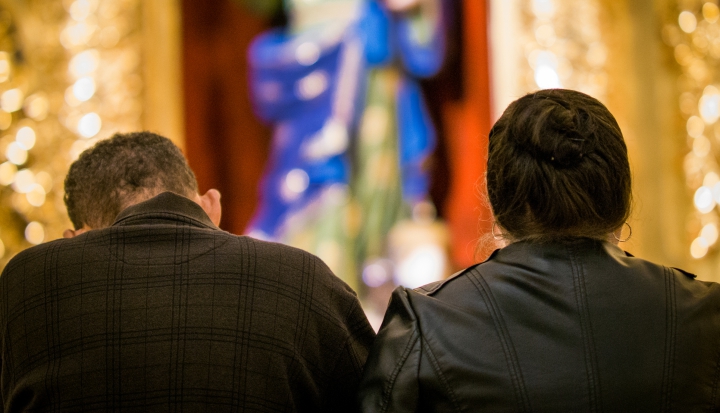Father Paul Keller, C.M.F. is a new online columnist for U.S. Catholic. His column, Smells like sheep, focuses on the places where pastoral ministry, public policy, theology, and ethics converge.
A young couple in their 30s sit near the front of the church at Mass. They are holding hands while crying silently and attempting to comfort one another. But they’re not at a funeral; they’re at a first communion Mass. Two beautiful children (twins—a brother and a sister) are receiving the Body and Blood of Christ for the first time. The woman is their mother. The man is the only father they have ever known. The couple has faithfully brought their children to Mass and religious education for years and regularly spent time at home teaching the children about their faith. But, despite all this, the couple has been told by their pastor that they may not receive communion. You see, they are not married in the church. The pastor has told them that they are living in sin, and the associate pastor has told their children the same thing. Despite the fact that the couple has experienced this relationship as the best thing that has ever happened to them, their pastor has told them that this relationship is putting their eternal salvation at risk. If they were to die in this state of sin, they have been told, they will be eternally damned and separated from God’s presence.
Many important issues will be addressed at this month’s Synod on the Family, but one discussion that caused a great deal of controversy concerned the possibility that divorced and remarried people will be allowed to receive communion after some type of penitential process. Even though many people may find some relief in the reforms to the annulment process that Pope Francis has called for, there will still be some who have remarried who do not meet the criteria for an annulment. The possible consideration of communion for those who are divorced and remarried would only be for relatively few couples in very specific circumstances. However, these couples do exist and their anguish is real. The couple described in the previous paragraph is one of them. (Although this description does not represent any real specific couple, it is, I believe, realistic enough.)
Why is this couple not married in the church? The woman and her first husband were both 22 when they got married. At the time, neither of them were too serious about their relationship with God or with issues of religion, but they got married in the church because they were baptized Catholics. A year into the marriage she gave birth to the twins. Unfortunately, shortly after that her husband was in a car accident. As a result of the accident, he developed an addiction to pain medication, followed by alcohol addiction. As the family situation spun out of control, her husband began to physically abuse her. She feared for her life and the safety of their children. Her husband disappeared for weeks at a time. Eventually she received word that he was involved in a robbery attempt that left one store clerk and one police officer dead. He was given a life sentence without the possibility of parole. Despite several attempt to contact him, he communicated through his lawyer that he wanted nothing to do with her or their two children. He filed for divorce shortly after his imprisonment.
As a young, single mother with two toddlers, she turned to her local parish for support. The parish’s Saint Vincent DePaul Society gave her regular aid. She began attending daily Mass and turning to God for strength. Eventually she began talking to a man who also attended daily Mass. He was kind, spiritual, and wonderful with her children. They began regularly spending time with each other and over time fell in love. She felt God had answered her prayers and was giving her a new life.
She tried to get an annulment so they could get married in the church. That was important to both of them. However, the car accident that led to the addictions that led to the violence, abandonment, and crime of her husband happened well into the marriage. The church investigation found that these events did not render their consent defective at the time of their marriage. Their marriage was valid and, therefore, indissoluble. To get married again would be to commit adultery. “Jesus is very clear about this,” her pastor told her.
Her response: “You mean that my children can never have a father? Even though I have met the most wonderful man in the world and he has helped me grow as a person and even grow closer to God, we can never be together? At the age of 26, I must spend the rest of my life alone? I’m not called to a celibate life like you! How can this be what God wants!?”
Her pastor responded, “With God all things are possible. Don’t you believe that? The saints and the martyrs were called to heroic virtue. You must be heroic too. God never gives us more than we can handle, so God will give you the strength you need if you don’t close off your heart to Him. This man can still be a father figure to your children. He can still be a friend to you as long as you are careful to never enter into a situation of temptation with him. You can love each other as brother and sister. If you were to give into your lust and be physically intimate, you would pollute your relationship. You would make a mockery of your sacramental marriage. That would be an affront to God. You would put your salvation at risk.”
“My sacramental marriage!” she exclaims. “You mean the ‘sacrament’ with the man who beat me and abandoned his family, who wants nothing to do with me, who killed two people, who will be in prison the rest of his life? Aren’t those things an ‘affront to God’?!”
“Well,” her pastor explains, “you did take solemn vows before God—for better or worse, in sickness and in health, until death. Those were vows you made to God. They can’t be undone.”
Sometime after this conversation she and her partner are married civilly. They continue to attend Mass, but have not received communion for years. They pray together, they volunteer at a local homeless shelter (they wanted to volunteer with Saint Vincent DePaul, but their pastor determined that this would cause a scandal, since they are living in sin), they have faithfully brought their children to religious instruction. All of their friends, family, and fellow parishioners know them to be a happy, generous, faithful, hard-working, and holy family. However, as far as the Church is concerned, God clearly considers them nothing but unrepentant and obstinate adulterers. They are in an ongoing state of mortal sin, just like unrepentant rapists, torturers or child abusers. Unless they repent and amend their ways, they will spend all eternity separated from God.
And so, at their children’s first communion, they sit in the front pew, heart-broken that they cannot join their children in the joy of receiving the Body and Blood of Christ. The church is quite certain that Jesus would not want his real presence disrespected by offering him to these sinners. The church is confident in its determination that this couple is not worthy to receive the Eucharist’s grace until they abandon their morally offensive adulterous relationship. That is what Jesus would want, no?
Image: Flickr cc via Nan Palmero













